Coronavirus: CSL begins production of COVID-19 plasma treatment
Production of a potentially lifesaving treatment powered by the antibodies of recovered patients begins in Melbourne, as leading charity World Vision identified groups that should get a COVID-19 vaccine first.
Coronavirus
Don't miss out on the headlines from Coronavirus. Followed categories will be added to My News.
Australia’s CSL will today begin refining the blood plasma of recovered COVID-19 patients so the antibodies it contains can be used as an experimental treatment for the virus.
Those most seriously ill with the virus will be given the opportunity to use the product under a clinical trial and it is hoped it might be able to prevent them being placed on ventilators.
When the body’s immune system fights off a virus it develops antibodies to stop the virus spreading.
It’s these antibodies researchers hope to isolate from the blood plasma of people who have recovered from the virus.
Patients who have recovered from the virus will be asked to donate their blood which will be collected by Australian Red Cross Lifeblood.
These antibodies will be pooled, purified and concentrated to make COVID-Immunoglobulin – also known as a hyperimmune globulin, the company said in a statement.
The product will be manufactured at CSL’s plant in Broadmeadows in Melbourne.
It is estimated up to 800 plasma donations will be required to make enough COVID-19 Immunoglobulin to treat 50-100 seriously ill people under the clinical trial.
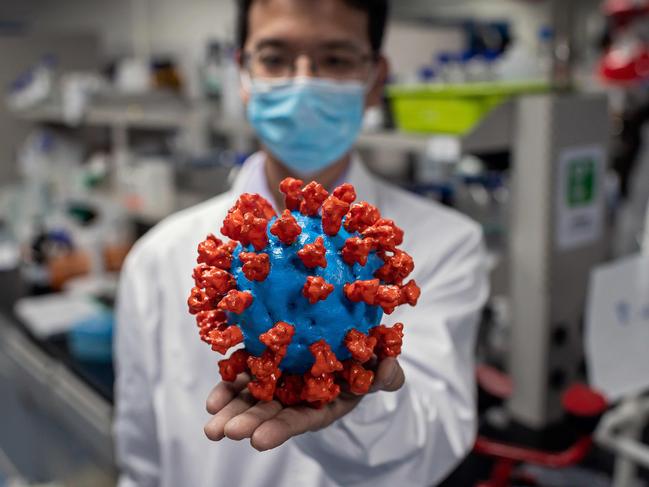
In the first phase of the project a small batch of COVID-19 Immunoglobulin will be produced and used to develop tests to detect the presence of the antibodies that fight the SARS-CoV-2 virus that causes COVID-19.
The second phase will involve a larger batch of COVID-19 Immunoglobulin that will be used in clinical trials in Australia’s hospitals to establish the safety of the product.
Shelly Park, Chief Executive of Lifeblood said, “Developing this new treatment requires plasma donations from people who have fully recovered from COVID-19, and whose plasma contains high levels of antibodies that can fight the SARS-CoV-2 virus that causes COVID-19”.
Health Minister Greg Hunt said, “Australia is playing an important role in the battle against COVID-19. CSL Behring’s manufacturing facility will be one of the first in the world to commence development of a COVID-19 immunoglobulin that may provide benefit to seriously ill Australians in need of treatment.”
WHO DESERVES COVID-19 VACCINE FIRST
Leading charity World Vision Australia (WVA) has called on the government to ensure that the most vulnerable and needy communities get first access to any vaccine to COVID-19 once it is developed.
World Vision said high-risk populations with poor access to health care must be prioritised once a vaccine is finally made available.
This includes indigenous Australians and people living in the most vulnerable parts of the world, said WVA senior policy adviser Nadine Haddad.
“These are places where vulnerable people have very limited access to health services and where social distancing is often impossible,” Ms Haddad said.
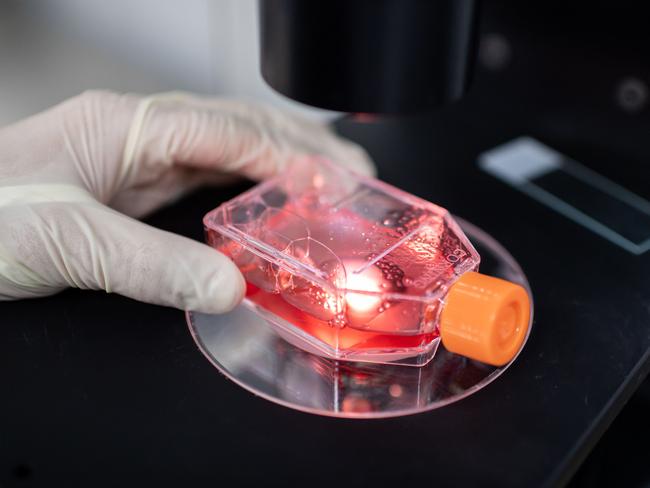
“We may well discover a vaccine, but it will be of no use to the world’s poorest and most vulnerable if there are no healthcare workers, no clinics, no syringes or no needles to administer it to them.
“Australia is showing leadership in developing a COVID-19 vaccine, and we call for similar leadership for the international humanitarian response. COVID-19 has created a health crisis, but it has also created an economic crisis and a humanitarian crisis as well. We need to combat all of these crises.
“A vaccine is not a cure-all for dealing with the wide-ranging impacts of COVID-19 already being felt around the world.”
The call came as a new study showed that there might be signs that the virus is mutating – and actually getting weaker as it does.
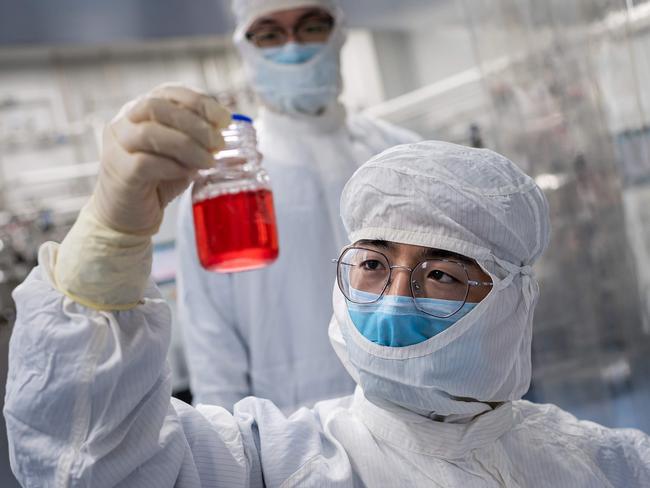
A mutation in the novel coronavirus mirrors a change that occurred in the genetically similar SARS virus in 2003 — indicating that the bug might be weakening, researchers at Arizona State University’s Biodesign Institute said.
Lead study author Dr Efren Lim and his team use a new technology called next-generation sequencing to rapidly read the genetic code of the coronavirus, referred to by scientists as SARS-CoV-2.
That technology helps researchers determine how the virus is spreading, mutating and adapting over time.
The New York Post reports that out of the 382 nasal swab samples the researchers examined from coronavirus patients in the state, a single sample was missing a significant chunk of its genome. Eighty-one of the letters were permanently deleted, according to the new study published in the Journal of Virology.
“One of the reasons why this mutation is of interest is because it mirrors a large deletion that arose in the 2003 SARS outbreak,” Lim said.
During the middle and late phases of the 2003 SARS epidemic, the virus accumulated mutations that lessened its strength, according to the researchers.
“Where the deletion occurs in the genome is pretty meaningful because it’s a known immune protein which means it counteracts the host’s antiviral response,” Lim told the Daily Mail.
A weakened virus that causes less severe symptoms may get a leg up if it is able to spread efficiently through populations by people who don’t know they are infected, the scientists say.
This is the first time such a deletion has been seen in the 16,000 coronavirus genomes that have been sequenced to date, according to the researchers.
VACCINE WARNING AS AUSTRALIA JOINS $12B VIRUS FIGHT
Scott Morrison has pledged $A352 million to a vaccine research fundraiser which has amassed promises of more than $A12 billion from countries around the world.
The funds, pledged at a videoconference summit hosted by the EU, fell marginally short of the 7.5b euros ($A12.8b) being sought, but more money could arrive in coming days.
Notably absent from the event was the US, where more than 67,000 people have died, and Russia.
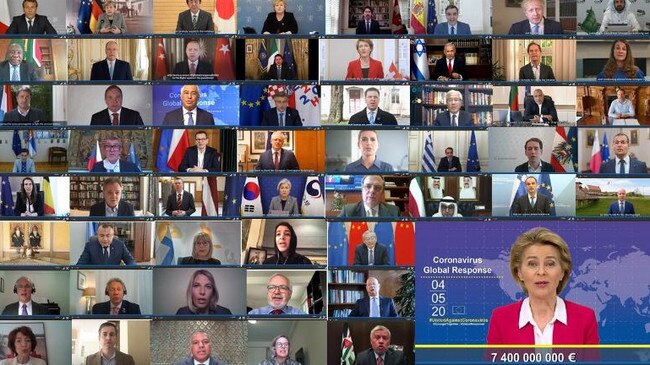
Mr Morrison sent a video message for the electronic event, hosted by EU President Ursula von der Leyen overnight, saying: “G’day from Australia. COVID-19 is putting us all to the test and it is a test we are all rising to. This is a great shared project by the peoples of the world with a clear purpose to find that vaccine for COVID-19. A safe vaccine, available to all, affordable to all.”
UN Secretary-General Antonio Guterres said the target being sought to help find a vaccine, new treatments and better tests for the disease would only ever amount to a “down payment” on the tools that will be needed. “To reach everyone, everywhere, we likely need five times that amount,” Mr Guterres said.
Thank you once again to all who contributed to this success! Our next milestone will be working with civil society and the global community of citizens. This will be a long fight, but today we can truly say: the world is #UnitedAgainstCoronavirus pic.twitter.com/Lb51YJFZzH
— Ursula von der Leyen #UnitedAgainstCoronavirus (@vonderleyen) May 4, 2020
Governments have reported around 3.5 million infections and more than 247,000 deaths from the virus, according to a count by Johns Hopkins University. But deliberately concealed outbreaks, low testing rates and the strain on health care systems mean the true scale of the pandemic is much greater. Ms von der Leyen wrapped up the event after three hours in which 7.4b euros ($A12.6b) was collectively pledged for vaccines, diagnostics and treatments.
“All this money will help kickstart unprecedented global co-operation,” she said.
The original aim was to gather around 4b euros ($A6.8b) for vaccine research, some 2b euros ($A3.4b) for treatments and 1.5b euros ($1.64b) for testing. The pledges were hard to track, beyond coming in various currencies. Some countries announced money for their own national research efforts combined with funds they would offer to international organisations.
Others also proposed a mix of loans with their funding. Pledges made toward vaccine research since January 30 were also counted.
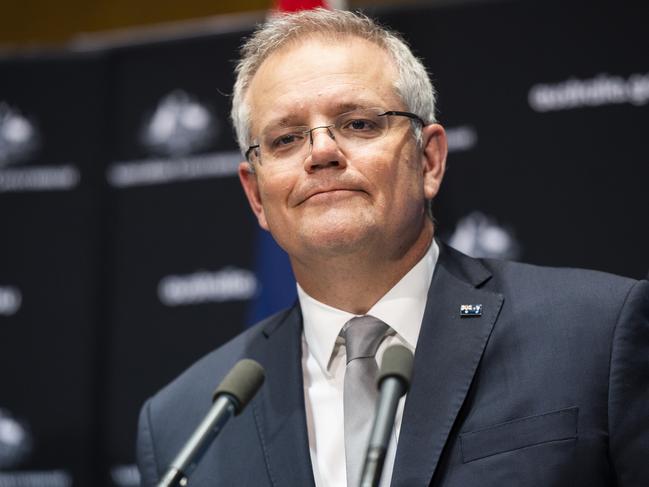
Apart from many European leaders, heads of state and government from Australia, Canada, Israel, Japan, Jordan, South Africa and Turkey spoke at the event, along with China’s EU ambassador.
French President Emmanuel Macron warned that “a race against time is under way” as he donated 500m euros ($A854m) on behalf of France.
British Prime Minister Boris Johnson said the race to discover the vaccine was not a competition between countries, but “the most urgent shared endeavour of our lifetimes”.
Among the larger contributions, Japan pledged more than $A1.2 billion while Germany offered 525m euros ($A896m).
Italy and Spain, perhaps the hardest hit by the virus in Europe, each said they would provide more than 100m euros ($A171m).
Switzerland, the Netherlands and Israel also pledged 378m euros ($A645m), 192m euros ($A328m) and $US60m ($A94m), respectively.
About 100 research groups are pursuing vaccines, with nearly a dozen in early stages of human trials or poised to start.
The US government’s top expert Dr Anthony Fauci has cautioned that even if everything goes perfectly, developing a vaccine in 12 to 18 months would set a record for speed.
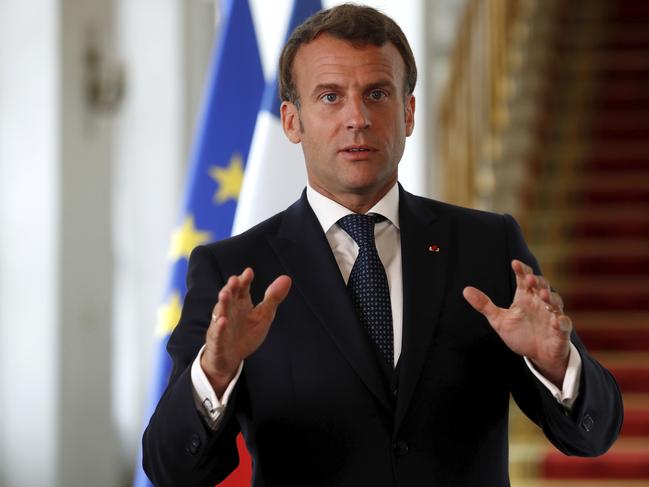
WHO’S STARK VIRUS VACCINE WARNING
But as scores of researchers across the world scramble to develop vaccines for the novel coronavirus, a World Health Organisation envoy is cautioning that one may never appear at all, according to a new report.
According to the New York Post, Dr David Nabarro, who also serves as a professor of global health at Imperial College London, raised the possibility in a new interview with CNN.
“There are some viruses that we still do not have vaccines against,” Dr Nabarro said.
“We can’t make an absolute assumption that a vaccine will appear at all, or if it does appear, whether it will pass all the tests of efficacy and safety.”
In that case, according to the report, treatments may be developed, but the world could still see yearly coronavirus outbreaks — with deaths — and lockdowns will need to be periodically strengthened and loosened.
“It’s absolutely essential that all societies everywhere get themselves into a position where they are able to defend against the coronavirus as a constant threat, and to be able to go about social life and economic activity with the virus in our midst,” he added.
It’s been a challenge to develop vaccines for common rhinoviruses and adenoviruses, which, similar to the coronavirus, can cause cold symptoms, according to Dr Nabarro.
Only one vaccine prevents two strains of adenovirus, and it’s not commercially available, he told CNN.
There are several viruses that still do not have a vaccine and it is, therefore, premature to assume one will be developed for coronavirus. Dr Nabarro said.
“You have high hopes, and then your hopes are dashed,” Dr Nabarro said. “We’re dealing with biological systems, we’re not dealing with mechanical systems. It really depends so much on how the body reacts.”
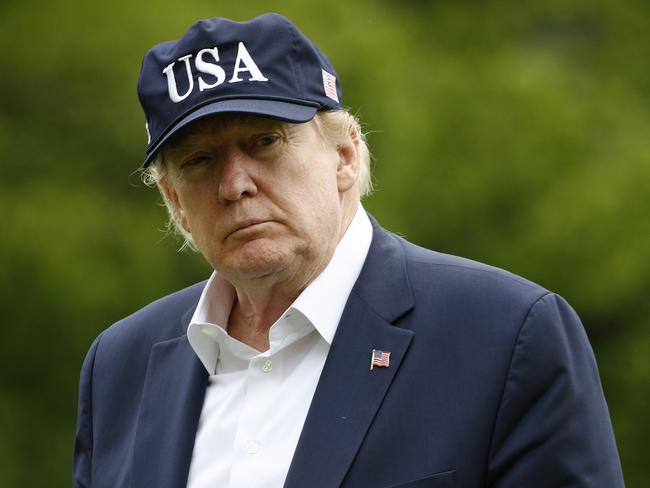
Most experts are hopeful that a COVID-19 vaccine will eventually emerge and US President Trump predicted that a vaccine would be ready by the end of 2020.
White House coronavirus task force expert Dr. Anthony Fauci said last month he thought it was within the “realm of possibility” that millions of vaccines could be ready by January. Experts previously estimated that a vaccine could take 18 months, if not longer. But some others say that bringing a vaccine to fruition in any of those time frames is unheard of.
“We’ve never accelerated a vaccine in a year to 18 months,” Dr. Peter Hotez, dean of the National School of Tropical Medicine at Baylor College of Medicine in Houston, told CNN. “It doesn’t mean it’s impossible, but it will be quite a heroic achievement.”
“We need plan A, and a plan B,” he added.
More than 90 COVID-19 vaccines are underway, in various stages, by research teams in companies and universities worldwide, Nature.com reported last week.
Human trials have begun for an Oxford University-developed vaccine that has protected six rhesus macaque monkeys from “heavy quantities” of the pathogen.
Those trials have also begun for a different vaccine, produced by the Massachusetts biotech firm Moderna.
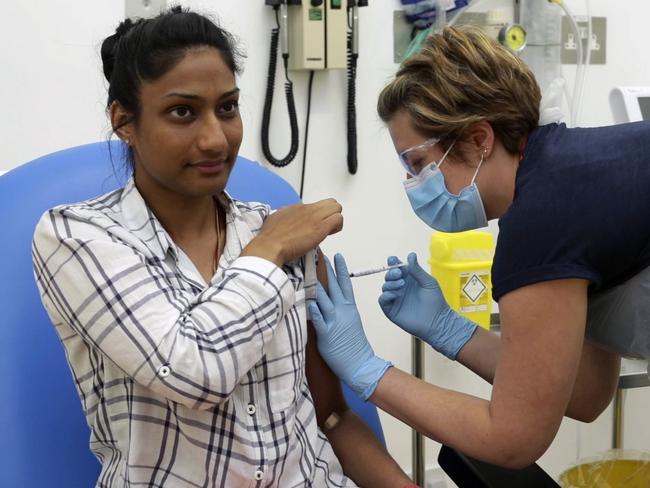
VIRUS TREATMENT HITS US HOSPITALS
It comes as the CEO of Gilead Sciences has said that their drug Remdesivir, long touted as a potential treatment for coronavirus, will be available in US hospitals this week.
Appearing on CBS’ Face the Nation news program on Sunday morning, Daniel O’Day said that Gilead had donated 1.5 million vials of Remdesivir to the US government, enough to treat 150,000 to 200,000 patients.
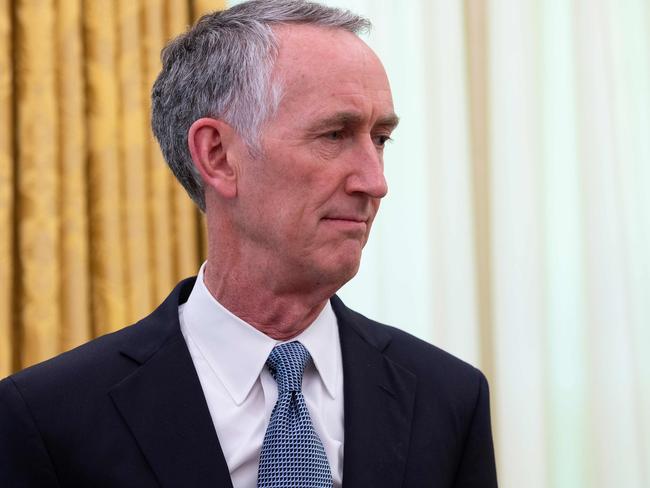
Priority will be given to patients in ICU beds, and the company has said it will start shipping tens of thousands of treatment courses this week.
A global study by the US National Institute of Allergy and Infectious Diseases last week found that patients given Remdesivir recovered faster and may be less likely to die.
Patients who received Remdesivir had a 31 per cent faster recovery time than those who received a placebo, the study found.
There was also evidence linking Remdesivir treatment with a lowered mortality rate, but researchers said it was not statistically significant.
Head of the US Centre for Infectious diseases Dr Anthony Fauci stopped short of describing the results as a “knockout” but said the study results were “a very important proof of concept.”
US President Donald Trump, who touted the benefits of Remdesivir in treating coronavirus long before they were proven called the test results “a very positive event.”
Gilead plans to provide 140,000 treatment courses by the end of May, more than 500,000 by October and more than 1 million by December.
Originally published as Coronavirus: CSL begins production of COVID-19 plasma treatment
